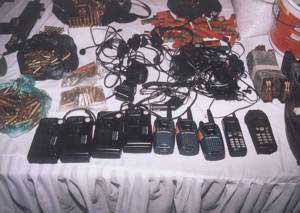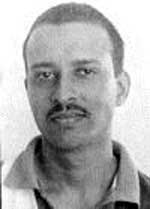LEADER of the opposition, David Granger, recently tabled a Motion in the House in which he is asking for the establishment of a Commission of Inquiry (COI) to investigate certain killings, deemed extra-judicial in some quarters, in the early 2000s.
|
|
 |
| Bullets, molotov coctails, and gun magazines found at a safehouse operated by the Mash Day escapees, where Brama was held. The other photo shows cell phones and other electronic equipment. | |
During the period in reference, political analyst, Freddie Kissoon had written a seven-part series on the subject of reference, in which he also looked at the integral role some prominent members of the Guyanese society played in the matter.
It is now opportune, perhaps to revisit these essays. The first part in the series was published in our last Sunday edition, with the second, third and fourth parts carried in subsequent daily issues of the newspaper earlier in the week. Today we carry Part V.
Part V – The Longevity of Terror
THERE is undisputed consensus that the violent robberies and brutal murders that gripped Guyana since the infamous February 2002 jailbreak was directly related to the five escapees and their acolytes in Buxton. The lull only started two weeks ago when the security forces retook control of Buxton. We are talking about 15 months of virtually non-stop terror. What reasons explain this length of time and not say a six-month spree?
The causes for the long life of Buxtonian terror fall into two categories – the mundane and the logistical. Let’s start with the first one first. By mundane, we mean the ordinary elementary causes. These would include lack of police resources. At the time of the jailbreak, the police lacked both adequate armoury and physical resources like heavy weaponry, armoured vehicles and sophisticated, electronic monitoring devices. It is a plausible response to say that had these facilities been at the disposal of the GPF, maybe the carnage would have stopped before it lived on for fifteen months.
For example, the state-of-the-art computer that the men at Good Hope had is basic to crime fighting in the modern world. What this equipment does is that it inhales the transmitting signals coming from cellular phones. It then enables the police to locate where the signals are. In the case of Buxton, in the late evenings, there would be meetings deep in the Gulf where residential houses are sparse. Who then would be sending out signals so later in such a deserted area in Buxton? It seems that the s ecurity forces have overcome some technical limitations in their crime fighting in Buxton. But media responsibility prevents further discussion on this subject. Under the classification of mundane factors we can also include the demoralization of the society and this included state, security forces and civil society. I have already dealt with the broken spirit of the GPF, especially the Black Clothes, during the killing spree. But the business class was a scared community just a month ago. Ocean Eleven took full advantage of the depressed life of the Guyanese society to further continue their journey of destruction.
ecurity forces have overcome some technical limitations in their crime fighting in Buxton. But media responsibility prevents further discussion on this subject. Under the classification of mundane factors we can also include the demoralization of the society and this included state, security forces and civil society. I have already dealt with the broken spirit of the GPF, especially the Black Clothes, during the killing spree. But the business class was a scared community just a month ago. Ocean Eleven took full advantage of the depressed life of the Guyanese society to further continue their journey of destruction.
The logistical cause holds a wider, though not exactly superior, exposition as to why Ocean Eleven lasted so long. We can subsume political factors under this heading and we start with this interpretation of the political nuance in comprehending the Buxton madness. When Douglas appeared on television, it would be foolish and dishonest on the part of any social researcher to deny that there wasn’t sympathy among members of the Afro-Guyanese community for what this jail escapee said he was fighting for.
Andrew Pollard, a lawyer with the law firm of Hughes, Fields and Stoby, defended the airing of the tape in a reply to Kit Nascimento. He based his position of the right to free speech. Andrew Pollard must be admired for his open stand which is what I respect in people. And though I didn’t agree with his legal dispute with Nascimento, I respect Pollard for what he did. There are those who would have said the same thing but hide behind a fictitious name. I hope Pollard doesn’t take this personally. It should not be. But Pollard’s position was symbolic of the way many Afro-Guyanese saw Andrew Douglas. I would like to make it clear here and say unambiguously that nothing I have written about the WPA, PNC and ACDA points towards support for Ocean Eleven. I have repeatedly used the concept of the Buxton conspiracy which included the Black extremist fringe and the Buxtonians Ogunseye constantly refers to as “the resistance.” My sources tell me that “the resistance” calls itself the PLM. You don’t need twelve doctorates from Harvard to know that there was a not so hidden sympathy for “the resistance” by organizations I referred to. Intelligence sources also told me that at private meetings of these organizations, there was open support for what I call the Buxton factor. When Hoyte went to address Buxton, he said there were no criminals there and their struggle was just. He was referring to the Buxton conspiracy that included the extremist cabal and the PLM.
It was this political support that made the police work harder in fighting the Buxtonian criminal enterprise. The talk-show hosts were unapologetic in support of Ocean Eleven. The African villages up the East Coast took their cue from these TV personalities and politicians. This gave a tremendous boost to the psychology of Ocean Eleven. Ocean Eleven was emboldened by the political support they got in the wider Guyanese society. Within this context one must also highlight the unashamed pillar that a large percentage of Buxtonians gave to Ocean Eleven. No other incident demonstrates this more graphically than when a group of child soldiers robbed an Annandale household and as the GDF platoon moved in to effect an arrest, a group of Buxton women surrounded the criminals and dared the soldiers to shoot.
It is important to understand how this kind of localized popular support further galvanizes the criminals to act with greater boldness. People told me that when Dale Moore and Mark Fraser were killed, some people in the ministries had a maudlin look on their faces and the talk-show hosts for that day were personification of lugubrious creatures. No society can stop criminal rampage if murderous robbers have that level of societal encouragement. As the series go on we will contrast the present situation with that six months ago to show how successful crime fighting can become when the security forces have the community on its side.
Two other logistical weakness made Ocean Eleven fertilize continuously. One is lack of intelligence gathering which will be dealt with another time. The other was the terrain Ocean Eleven operated in. It is easy to hide in an environment where the houses are within touching distance of each other and the village is compact and dense. If anyone wants to understand how difficult it was to confront Ocean Eleven in Buxton, they should see the movie, BLACK HAWK DOWN, which is based on the true story of a contingent of American marines who went into a specific area in Mogadishu (capital of Somalia) to capture a warlord named Adeed. The mission failed and was aborted. The marines couldn’t flush out Adeed for the same reason the GPF couldn’t go into Buxton and confront Ocean Eleven.
Ocean Eleven’s modus operandi followed military guidelines. Because of how the village is situated, entry is recorded by secretly hidden lookouts who used transmitting sets. Of course this comes back to the lack of modern equipment by the GPF. When GPF members cross the railway embankment to get to the Gulf, members of Ocean Eleven would be watching them from normal houses that the police never dreamt had hidden escapees. This logistical advantage cost the lives of a number of outside fighters who went in to take on Ocean Eleven. They were sitting ducks.



.jpg)










